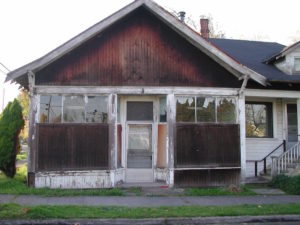The life and times of a neighborhood store and its people
by Doug Decker, historian
This is the third of a four-part series about the early days of the Alberta business district, written by Northeast Portland neighborhood historian Doug Decker. To read more of Doug’s research and writing— or to read the full text of the early news stories mentioned here—visit his blog

Picking up where we left off, one of our favorite momand-pop grocery stores, at the northwest corner of NE 27th and Going, had risen from a vacant lot in the midst of the Alberta District’s 1909 muddy streets, to a men’s clothing store in 1911, to a vibrant neighborhood grocery run by a local family from 1921 to 1943. The photo featured in the April edition of Concordia News showed proprietor Agnes Coulter out front of the store—Alameda Park Grocery—in its prime.
But during the war years, like so many things, shopping patterns were changing.
In 1943, Isabelle Coulter sold her pride and joy to Charles and Vera Fiebke who held it for just a year before selling it to Henry and Ruth Rieckers, who owned the business until 1953. During this decade, the business was referred to as “Rieckers” and as “Rieckers Grocery.” A classified advertisement in The Oregonian on March 3, 1953 indicated the Rieckers were retiring and putting the business up for sale, asking $6,500.
On June 24, 1953, the property was purchased from the Rieckers by John Henry Moad and his wife Lucy Jane Moad. They operated the store—as Moad’s Grocery—from 1953 to 1961 when it was sold to Robert A. and Louise M. Klatke, who changed the name to Bob’s Quik Stop Market. But the Klatkes didn’t hang on for long.
An article in The Oregonian on June 29, 1962 reports a robbery at Bob’s Quick Stop. Klatke, age 56, was robbed with a knife to his throat. A few months later, he and Louise put the store back on the market, selling it to Agnes Martin on November 2, 1962. Then, sometime during the mid-1960s, the building ceased functioning as a store.
By that time, mom and pop neighborhood grocery stores were having a hard time hanging on. The whole retail grocery business was changing and local grocery stores were quickly becoming convenience rather than primary shopping locations. (To read more about local shops that once served the neighborhood, check out www.alamedahistory.org and click on the story When Mom and Pop Stores Ruled.)
The Martin family owned the property for the next six years and at least one reference to the building shows it as the Mt. Zion Church of God in Christ. The Polk City Directory for 1965 shows the building as vacant, and in 1967, it is listed simply as L.S. Martin. On September 17, 1968, the Martins sold the property to Carl E. Bass (son) and Viola Matheson (mother). Bass, who was a potter, turned the space into an artist’s studio and lived in the property until his death in April 2001 at the age of 73.
The property was purchased from the Bass estate by investor/developers George and Isabelle Zitcak, who held it for just four months before selling it in April 2002 to Chad Crouch and Sheryl Eckrich. This is where the story gets interesting, which will be the subject of our final installment in the next edition of Concordia News.